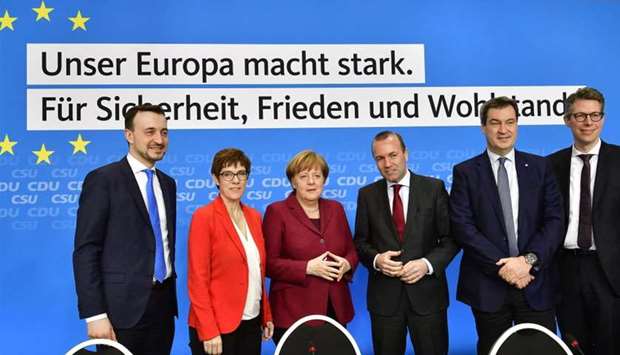Germany's conservative alliance of Christian Democrats (CDU) and the Bavarian Christian Social Union (CSU) said they have set aside their long-standing differences and presented a common front on Monday ahead of EU parliamentary elections in May.
‘The most important message today is that we couldn't have imagined a harmonious event like this five years ago,’ Markus Soeder, head of the Bavarian CSU, a sister party to the pan-German CDU, said ahead of a meeting of party leaders in Berlin.
The two parties signed off Monday on a 22-page common platform for the European Parliament elections on May 26, presenting themselves as a foil against populists on the left and right of the political spectrum. Party leaders also suggested they would hold the line against extensive EU budget reforms proposed by French President Emmanuel Macron.
The conservative alliance has been at odds for years, particularly over immigration policy amid the arrival of more than 1 million refugees in Germany over 2015 and 2016, with many coming across the Austrian border into Bavaria.
Soeder said much had changed in Europe over the past five years, but he also suggested the newfound harmony was due to Anne Kramp-Karrenbauer taking over the CDU party's leadership from Chancellor Angela Merkel, who has promised to step down as German leader at the end of her current term.
Developments in the CDU had ‘made a new common approach possible,’ Soeder said. In that sense, the EU election programme also served as ‘a new start for the common work of CDU and CSU.’ Kramp-Karrenbauer, in a press conference following the meeting, said it was up to the EU to play a bigger role on the global stage. She pushed for a common foreign and security policy, more border protection and an EU-wide approach to immigration. She agreed that reaching a joint electoral platform with the CSU was anything but a given after the tumult of the last few years.
Kramp-Karrenbauer said she would push for Manfred Weber, the party's chief candidate in the parliamentary elections and head of the European People's Party, to become the next president of the European Commission after Jean-Claude Juncker.
The conservative alliance is also positioning itself against Germany's centre-left Social Democrats, who are pushing for deeper economic integration. That also means party leaders have remained lukewarm to the EU reform proposals of France's Macron.
‘The proposals of Mr. Macron are important, but they are not worth more than those of other heads of state,’ said Julia Kloeckner, deputy leader of the CDU faction in Germany's parliament.

